|
|
|
Sort Order |
|
|
|
Items / Page
|
|
|
|
|
|
|
| Srl | Item |
| 1 |
ID:
181692
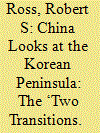

|
|
|
|
|
| Summary/Abstract |
There are two power transitions under way on the Korean Peninsula. Firstly, there is a US–China power transition, reflecting China’s emergence as an economic and military power in Northeast Asia. This is challenging US regional dominance. The second transition reflects South Korea’s development of an independent defence capability against North Korea. A consensus has emerged among Chinese scholars and analysts in government think tanks that these two trends have encouraged South Korea to place itself at greater distance from the United States and China, and to pursue an independent policy toward North Korea that supports Chinese policy preferences. Chinese understanding of the dual power transition is reflected in Beijing’s policies toward South Korea, North Korea and denuclearisation. China no longer contributes to North Korea’s diplomatic isolation or to sanctions regimes against it, with implications for US policy.
|
|
|
|
|
|
|
|
|
|
|
|
|
|
|
|
| 2 |
ID:
181685
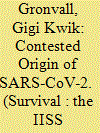

|
|
|
|
|
| Summary/Abstract |
This article describes what is known about the origin of SARS-CoV-2, with implications for policy, biological research and public-health surveillance. Theories about the origin include a natural emergence; a laboratory accident with a naturally harvested strain; an accident with a naturally harvested strain modified in a laboratory; and the deliberate creation of a biological weapon. While available scientific evidence points to a natural zoonotic event as the origin of SARS-CoV-2, this paper recommends specific steps governments and scientific institutions should take to address uncertainties about the origin of the COVID-19 pandemic, as well as to make all potential causes for a pandemic less likely to produce one in the future. Immediate steps include promoting international scientific collaboration, addressing scientific misinformation and disinformation, fully implementing ‘One Health’ and reining in the illegal wildlife trade.
|
|
|
|
|
|
|
|
|
|
|
|
|
|
|
|
| 3 |
ID:
181686
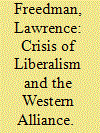

|
|
|
|
|
| Summary/Abstract |
Liberalism as the ideology of the Western alliance is in crisis. Having seen off Nazism and communism, it gained influence after the end of the Cold War, which produced optimism about security, human rights and global prosperity. Now liberalism, shaken by the financial crisis and the wars in Afghanistan and Iraq, is in retreat. Illiberal states, notably China and Russia, are reshaping the international system. Liberalism may not be able to continue to bind allies together, or enable them to cooperate effectively in a severe crisis. There are three counters to a gloomy prognosis, however. Firstly, heightened great-power competition has reinforced rather than undermined the alliance. Secondly, Russia and China have no substantial alliances, and are showing that authoritarian governments face serious problems of their own, including entrenched leaderships. Thirdly, liberalism remains better equipped to adapt to new circumstances.
|
|
|
|
|
|
|
|
|
|
|
|
|
|
|
|
| 4 |
ID:
181694


|
|
|
|
|
| Summary/Abstract |
While many consider the threat posed by nuclear weapons to be greater than ever, the general public has largely lost interest in the issue of nuclear disarmament. To reinvigorate public support for a nuclear-weapons-free world, disarmament advocates have presented a range of arguments about the necessity of nuclear abolition. This article presents original data from a public-opinion survey of US citizens to examine the relative effectiveness of the most common pro-disarmament arguments. The study found that the least persuasive arguments had to do with the costs of maintaining a nuclear arsenal, the humanitarian impact of nuclear-weapons use, and the threats of nuclear terrorism and nuclear war. The most persuasive arguments related to nuclear-armed ‘rogue states’ and the possibility of nuclear accidents. Political stakeholders and civil-society actors might use these findings to more effectively frame their public messaging.
|
|
|
|
|
|
|
|
|
|
|
|
|
|
|
|
| 5 |
ID:
181691
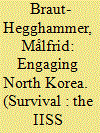

|
|
|
|
|
| Summary/Abstract |
North Korea and the United States are edging towards re-engagement. They agree in principle on pursuing a phased approach to negotiations but disagree on how to begin and what the end goal should be. A warming-up phase can allow states to informally explore specific options for future engagement. By participating in activities such as table-top exercises, simulations and familiarisation visits, the participants develop a more specific understanding of the purpose and format of the activities and verification measures that might follow a formal agreement. This process engages the technical and military bureaucracies at an early stage. It provides a private setting to raise concerns and address misunderstandings. It is an opportunity to demonstrate goodwill and interest in engagement that does not require concessions. Drawing on past examples, this article suggests specific options for a warming-up phase involving North Korea and the United States.
|
|
|
|
|
|
|
|
|
|
|
|
|
|
|
|
| 6 |
ID:
181687
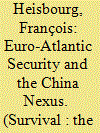

|
|
|
|
|
| Summary/Abstract |
As China has emerged over the past decade as a peer competitor of the United States, the bilateral relationship has become confrontational. Given the relatively wide range of possible strategic outcomes, Europe’s primary task is to organise itself for uncertainty. It must also assume that the US will react negatively if Europe is seen as running counter to America’s policy in the Indo-Pacific and build resilience into its policies to deal with sudden shifts in US policy. Europe’s overarching aims should be defending itself against a revisionist Russia, insulating Europe against direct Chinese coercion, helping like-minded countries prevent China from overwhelming the rules-based international order and avoiding a major war between nuclear powers. Despite the acrimony in the China–US relationship, the fear of nuclear annihilation that helped keep the Cold War cold is notably absent. Trust, especially among allies, is therefore paramount.
|
|
|
|
|
|
|
|
|
|
|
|
|
|
|
|
| 7 |
ID:
181688


|
|
|
|
|
| Summary/Abstract |
Liberalism and its republican precursors provide the largest and best-developed body of restraint theory and practice. Realist, libertarian and other criticisms of liberalism and liberal internationalism fall short on both historical and theoretical grounds. Liberal internationalism has had a profoundly progressive – even revolutionary – impact on the modern world order, advancing the grand transition from a world of empire to a world of nation-states, building an infrastructure of rules and institutions to foster and protect liberal democracy, and generating international coalitions and projects for tackling the gravest threats to world order and humanity. Unlike the schools of thought that make up the Quincy coalition, liberal internationalism places at the centre of its vision the cooperative organisation of international order – led by the United States and other liberal democracies, allies and partners – to defend shared liberal values and manage global problems of interdependence.
|
|
|
|
|
|
|
|
|
|
|
|
|
|
|
|
| 8 |
ID:
181689


|
|
|
|
|
| Summary/Abstract |
The emerging consensus in the United States is that the real US objective in talks with North Korea should no longer be its denuclearisation. The superficially sensible conventional wisdom underlying this position is that Pyongyang learned from America’s adventures in Iraq and Libya that only a nuclear deterrent precludes regime change, and that it would not relinquish something it worked so hard to attain at the negotiating table. These assumptions may still be wrong, and it would be a mistake to pre-emptively surrender an essential objective, especially given that doing so would incentivise Japan and South Korea to acquire nuclear weapons. Washington should carefully explore the possibility that the North would give up its nuclear weapons if it could achieve political, economic and diplomatic integration into the international community and true normalisation of its relations with the US, and prepare for an arduous negotiating process.
|
|
|
|
|
|
|
|
|
|
|
|
|
|
|
|
| 9 |
ID:
181690


|
|
|
|
|
| Summary/Abstract |
The denuclearisation of North Korea is unlikely. Neither pressure nor rewards will persuade North Korean decision-makers to surrender their nuclear weapons because they have good reasons to see denuclearisation as tantamount to collective suicide. Therefore, the only realistic goal of the United States and the international community is arms control. There are ways to reward North Korean leaders for their willingness to restrict their nuclear and missile programmes. These include partial removal of sanctions, economic assistance and subsidised investment. However, any deal will be costly, since North Korea will exact maximum compensation for its willingness to accept an arms-control regime. Reaching an agreement also will be time consuming. A grand bargain is unattainable, and the parties will have to take small, incremental steps.
|
|
|
|
|
|
|
|
|
|
|
|
|
|
|
|
| 10 |
ID:
181693


|
|
|
|
|
| Summary/Abstract |
Almost a year into US President Joe Biden’s term of office, his administration still lacks a clear Syria policy. The persistent lack of a cogent US approach to Syria carries dangerous implications for the people of Syria and the world at large. Going forward, the US ought to chart a more deliberate and consistent path. Despite recent setbacks, the Kurdish-run autonomous administration of north and east Syria still stands as an exceptional model of inclusivity and embryonic democratisation in a deeply troubled region. By providing limited political, economic and military support to that body, the US could redress past failures, regain lost trust among its partners, counter jihadist extremism and help the people of Syria secure a better future.
|
|
|
|
|
|
|
|
|
|
|
|
|
|
|
|
|
|
|
|
|